
Get to know a bartender: Matt LaRochelle, Cold Tea
Cold Tea, at this point, is a bona-fide Toronto landmark — if Anthony Bourdain's stamp of approval is anything to go by. It's certainly notorious for other things as well, such as its easily-missed entrance and behemoth of a patio. Though the drinks at Cold Tea are quite rightfully praised as one of the best in the city, owner Matt LaRochelle has much more abstract ideas as to what makes a great bar. "It's the conversation. The strong, silent type isn't going to fare well in this job," he says with a chuckle.
It's the hottest day of the year when I get to Cold Tea to speak to LaRochelle on a rare day off. Despite his reputation as one of more creative bartenders in the city, he's nursing a simple can of ice-cold Sapporo. Over various concoctions of tequila, whiskey and gin, he tells me about his favourite neighbourhood, penchant for improvisation, and the year he spent as a Bay Street suit.
Matt LaRochelle; are you French?
French-Canadian, actually. My dad's side of the family's from just outside of Montreal. My dad grew up there, in Lennoxville, by the Eastern Townships.
So did you grow up here?
Yes, I did. Born and raised.
Downtown, or...
I grew up at Jane and Annette, so the west end. I was there until I was eighteen, and moved out into the city.
How did you start bartending?
I started when I was eighteen. I was a barback at a big club, which was where I learned the behind the bar stuff. It's where you really learn about organization and speed and volume, and how you deal with those problems become habits. And it can be chaos. Even if it's only a thousand vodka-sodas.
After that, I got into actual bartending. Then I was at restaurants for quite a few years, and did service. Then I came back to bartending for this place, basically.
So you got started in a big club. Like a Richmond or King Street place?
Yeah! Let's just say it was a very, very big place.
That must've been intense.
It was pretty crazy, but like I said: a really good way to get started. My business partners, Oliver [Dimapilis] and Stacey [Welton] — they'd worked at a similar venue for years. We all think there's a lot of value in starting in that environment and refining your skills later on.
Most professions start off that way. If you don't pay your dues, you'd never get anywhere.
Yeah! And you get to see both sides of things, which is helpful.
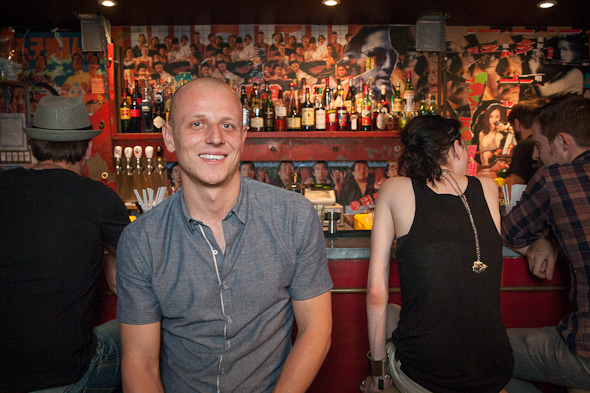
Where did you first actually bartend, then?
I did that at a couple restaurants around the financial district. I was at those places for quite awhile — that's how I got into serving and waiting tables. Then I was at Delux, right before we opened this.
So you've gotten the best of both worlds, in terms of education: you know the pressure and need for organization in bartending for a big place, and the importance of good service and talking to people in being a server.
Exactly. I think getting some front-of-the-house experience in serving was really helpful in doing fine points of service. That's obviously scaled way, way back when you're behind the bar, but it's nice to have that kind of training ingrained in you, even if you're just cracking open a beer or pouring a drink for somebody. I was really fortunate to work for some amazing people; to see a bunch of different aspects to this industry before I opened this place.
Were you doing anything besides bartending? Like a hobby that got you into mixing drinks?
I did a bit of a corporate thing at one point. I was a foreign exchange trader for a bit.
What!
[laughs] Yeah. I had a pretty 9-5 lifestyle for a bit. I definitely wasn't doing this anymore. So I ended up, in my free time, going out as much as I could. I was drinking certain things at certain bars, reading about it because I didn't get to do it in my job anymore... that's kind of what got me into learning about drinks and different spirits and extending my knowledge on that. I started doing that as a hobby, and that's what made me realize how much I wanted to get back into it. That break was what convinced me to try it again wholeheartedly.
That's awesome. So taking that corporate break was what got you into — forgive me, I hate the word — mixology?
Oh my god, yeah, me too. [laughs] I consider myself, first and foremost, a bartender. That's where it should always start. I do love how cocktails have become an important thing in the city, but I'm very glad that bartending is where I came from- — giving people a good night, a good experience. I'm happy that cocktails are being added into this experience; that you can go almost any bar in the city and get a Negroni or Manhattan or whatever. I think cocktails, to an extent, should become expected.
It's a standard thing.
I love that there are places you can go that do an amazing job with obscure products and techniques, but I do think that bars should have a base knowledge and ability.
Going back on the trading thing. How did that happen? Were you into business?
Not really! I was working in Mercatto on Bay Street, and the clientele there are mainly bankers or lawyers or traders. I had a very misguided notion of wanting to get out of the industry at the time — which I now obviously regret mdash; but two of my customers, who'd come in every day, worked for a foreign exchange company. I'd been talking about wanting to do something different, and they had a position open. So they ended up hiring me through the restaurant. I had no experience in trading whatsoever, but that job as well is very fast-paced, customer service-oriented, so I guess they thought I would do okay in that. I did it for a little bit, and really missed being in the bar environment all the time. So Stacey, Oliver, and I decided to open a bar.
I like how you describe a bar as an environment. You're right; they're places with different sets of rules and standards, places where certain possibilities and stories can begin and exist that can't anywhere else.
That's why bars are so amazing. It's really fundamentally about putting people together and creating that kind of environment where anything can happen. We don't have any other place like that in society; there are no other outlets. It's cheesy to say things like this, but it's true: all of those social walls really do disappear. Obviously alcohol helps, with people losing their inhibitions and getting a little looser, but it really is an environment where it is perfectly acceptable to talk to a stranger. It's acceptable to make a new friend out of the blue without some sort of external circumstance making that happen. I honestly can't think of anywhere else. Maybe a streetcar? Or an office?
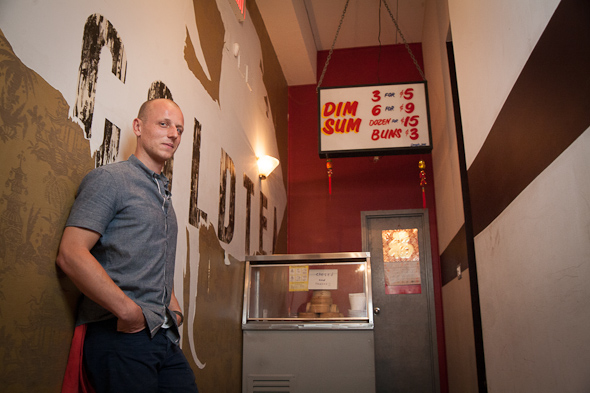
Well, no. In an office — you've got work. You have to be 'professional' about things.
Right! And in a bar, you've got no social rules. Everybody is there for camaraderie. Or to get laid [laughs]. Everybody signs that social contract when they come into a bar: the social contract of enjoying yourself and being open and having fun. You never know where the night is going to take you.
It's almost like its own method of socialization. It's very easy to feel at home in a bar. Like being in your own house, you're stripped of these expectations that everybody else has of you.
That, for me, is why I came back to this industry. It's why I've always been in love with the industry. For ten years, it was all that I've done; it's where I feel comfortable. It's where I want to spend 50 hours a week. But I can't drink for 50 hours a week, so. [laughs] It's better to be working.
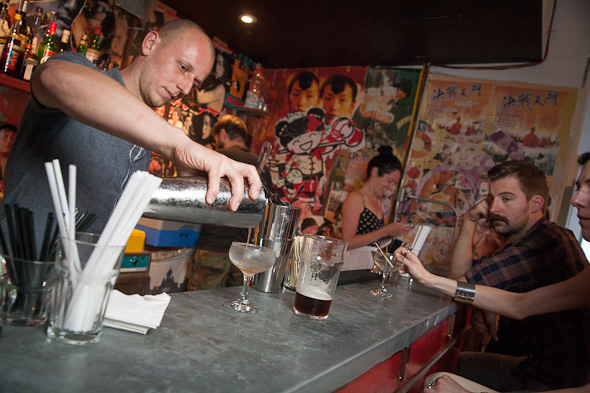
How did you and Stacey and Ollie decide on opening Cold Tea?
Oliver and Stacey had worked in Spaha for quite a long time with Dave and Lucy, who later opened the Embassy. Stacey was their first employee, actually. She and Oliver still knew each other, and Oliver eventually came over to work at the Embassy as well, right up until we opened this bar. I'd always hung out in the Market and at Ronnie's and in the Embassy. We'd been friends for five years. We were all doing the same thing, working in the same industry, so the next step was to get our own space, which we were lucky enough to find.
It's a very unexpected space.
It's definitely pretty unique. We were looking around and putting offers on places, but none of them panned out. Then we kind of walked into [Kensington Market Mall]. It looks nothing like it does now — it was four bays — but we saw the courtyard, which was just covered and full of garbage with a forklift machine in the middle, and fell in love. It took a little bit of imagination. We wanted something unique, as there are so many spaces in the city. To be able to have this dramatic entrance and the incredible courtyard/patio... it was just so unique. It was completely worth the time and effort to turn the original to what it is now.
Has it always been an endpoint for you to open your own place?
Not in concrete terms like this. I think anybody doing anything they're doing, when it gets to a certain point, there's only one next step. Bartending was pretty much the only thing all three of us had ever done. At a certain point, you're either going to move up or get out. And it's just really fun. It's great to have your own place.
How has bartending at your own bar compared to bartending elsewhere?
It's a little different. The ownership part provided the learning curve for me — all the stuff you have to do during the day in order to make the place operate smoothly — but at night, when I'm behind the bar, it's pretty similar. It's what we've always done. It's neat to have that kind of control — picking out the products we serve, seeing all the things I believe in coming to life around me. It also makes me feel really proud whenever somebody has a great night. When I worked elsewhere that pride factor still existed for me, but for it to happen in a place that I'd created... it's even more exciting. It feels really good. Every bartender likes that. You can ask anyone who works in the industry: a big part of it is making somebody's night.
Has it ever gotten to the point where you're an amateur shrink?
Absolutely. You play a lot of different roles as a bartender. You need to give people what they want, whether it's a drink, or somebody to talk to. 90 per cent of the time it's the best part of the job. You do have your bad days where you're feeling a little grumbly — that's why it's a job — but 90 per cent of the time, having people talk to you... I can't imagine there be any other job where I'd have the opportunity to meet as many people as I do now. Or hear as many stories. I'm provided these amazing snapshots into people's lives.
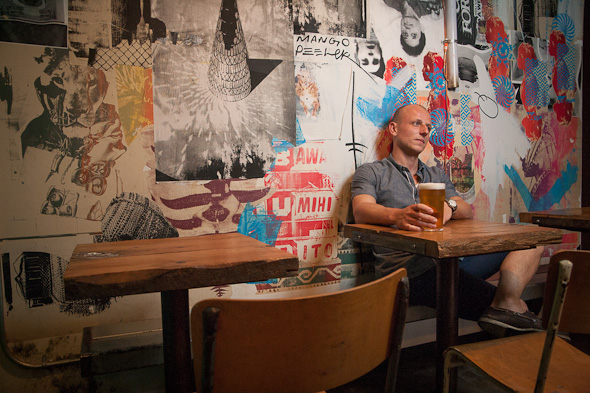
What's the worst thing you've ever heard?
There have been some dark moments. You have people who just got divorced five minutes ago, or you have people who got engaged five minutes ago. It's the highs and lows. It's neat to be this person people can be very intimate with knowing there are no consequences. You can be much more open with a stranger than you can be with your friends.
You mentioned having grown up here. You must know the city quite well.
Yeah, I love Toronto. I'm a die-hard Toronto kid for sure.
What do you think is one thing that's lacking in Toronto's bar scene? We have so many different kinds of bars now, catering to so many different kinds of customers. But what's the one thing that's still missing, especially compared to other cities?
That's a good question. And if you had asked me two years ago, I would've had so many things to say. Toronto, for a long time, in order to be really successful, you had to make everything for everyone. I remember in the early 2000's, you could've gone to any restaurant in the city and ordered a Caesar salad. You could be at a French restaurant; you could be at an Italian restaurant. Even a Thai restaurant would have one.
Now, I think we've reached a point where there are these really specific places that's managed to survive. Over the last two years you've had an incredibly number of young people who've stepped up and created these places with incredibly diverse ideas and tastes. You've gotten to a point where you can go to a place like Black Hoof can just do what they're doing and be fine. You've gotten to a place like 416 Snack Bar; Grand Electric. They all do an incredible job. Honestly, now, I don't think there's an answer to that question. Back then, generalness was so important to survival. Now we can do what we want. The city's really responding.
I feel like restaurants' success is almost because of that specificity, rather than despite it. People actually enjoy being told what to eat and what to enjoy.
Yeah! It gets people excited. People like trying new things now. And this way, I think you get a better bar or restaurant. Everything's that's on the menu, you know is because of the chef's vision and passion. It's there in the ingredients and the design; there was somebody behind this, and it's done this way because they really believe in it. We no longer have to cater to everyone. This allows people who are looking for what you're doing to find you, and enjoy it. There's really something for everyone now, but in a different way.
You guys are unique with the flavors and ingredients you guys use. How did it get to that point?
We definitely strive for that; thank you. I mean, we're a bar. We want to serve cocktails, and I think they can be so much fun. They're delicious. It's something customers should come to expect all the time now, so — yes! We've definitely done some fun things because they should be fun. But we've also failed so many times. A lot of the process comes from just looking at the bar, and thinking maybe this will go well with this. There's been way too many times in which I've taken a sip and was like, ugh, no.
In terms of real cocktail innovation, though, we're not even close to places like Origin, or Cocktail Bar, or the Harbord Room. Dave and Jen [Agg] are the parents of cocktails in this city. I think those places are where you can truly find boundaries being pushed. That's where you're seeing avant-grade stuff. We're still trying to just make good drinks for people that are a little interesting.
What was the best thing you've ever made? I know you have a rotating menu.
We do sometimes have a cocktail menu, but typically we want somebody to come in and be like, I feel like rum, we be able to take that little information and come up with something completely original. All of our bartenders know, and can come up with a cocktail for whatever that is you're looking for. That's what I really want this place to do as often as possible. I think we're blessed to be able to do that. We have such an incredible staff that allows for this to happen.
What's your favorite ingredient?
I love making drinks with tequila. It's really versatile: it's light, but it's got a lot of spice, flavor, and unique overtones to it. The ingredients added to it, with different elements, will pull various flavours from the spirit. I'm a huge tequila fan.
Bourbon, of course, is a mainstay. It's what everybody's drinking right now. I do love the classic, boozy cocktails. When the weather's cooler, the darker drinks is where I want to be.
And favourite cocktail?
I definitely drink Negronis more than any other cocktail. That's definitely a bartender favourite. It's light enough that you can have a few of them without falling on your ass, but it's got just enough complexity to not be boring. It's bright, easy, and fast. And very pretty.
What do you not like working with?
I have no problem making anybody whatever he or she wants to drink. I know vodka gets a lot of hate, but I think it can be great. In a cocktail it's kind of pointless, because it's just going to taste like whatever else you put in it. On its own it can be good, but for a cocktail you're better off with something like gin, or tequila. Those spirits still have a lightness to it, but it'll at least have flavor.
However. On a hot day like today, there's nothin' better than a vodka soda.
Making a cocktail for you is obviously a process; they're quite complex. What's a favourite cocktail — not to drink, but make?
I really love making Sazeracs. It's an old classic; a great drink. It's fun to make because there's really nothing in it. It's rye, sugar, bitters in a glass. Because it's so simple, there's a nice ritual to it. You can put a bunch of stuff in a shaker, shake it and pour it in a glass — you get some of the most delicious drinks that way — but you don't feel like you're doing much as a bartender. In chilling the glass, muddling the sugar, putting the bitters in, stirring the rye, making sure it's the right temperature... the Sazerac is a fun drink to make. The Old Fashioned, too; its greatness lies in how you make it, not what's in it.
It's like cooking that way.
Yeah! For awhile you've got nothing happening, then suddenly there's something there. What I really strive for, in a drink, is that its sum is greater than its parts.
For me, there's nothing I'd rather do. I have friends who are chefs and I really admire what they're doing, but to talk to people — like this conversation we're having, for example — is what I need. I need that person-to-person interaction. As much as I like making cocktails, it's about being a part of the night as a whole.
You don't know a bar or a restaurant fundamentally by what they serve. You can go to a bar just for the atmosphere, or for the people. You might be excited about the cocktail, but it's the environment more than anything else.
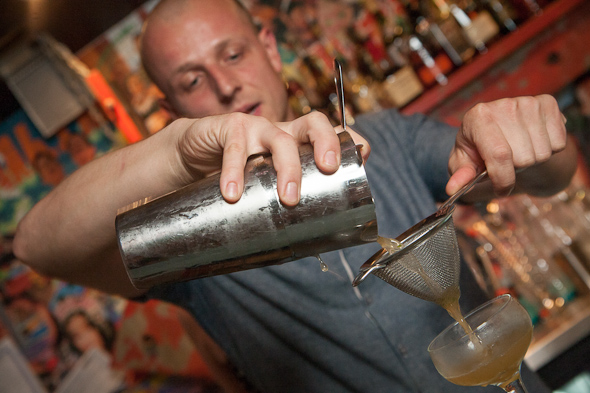
RAPID FIRE QUESTIONS
Straight up or on the rocks? Rocks.
Gin or vodka? Gin.
Light or dark? Dark.
Sweet or dry? Dry.
With a twist or olives? Twist.
Lemon or lime? Lemon.
Tonic or soda? Soda.
Beards or moustaches? Taylor Corrigan's moustache.
For more bartender profiles, visit our Toronto Bartenders Pinterest board
Photos by Jesse Milns
Latest Videos
Latest Videos
Join the conversation Load comments







